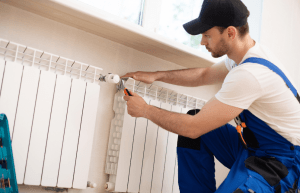Addressing radiator problems promptly is important for keeping your heating system running smoothly. Common issues include faulty valves, which can cause temperature control problems and leaks. Corrosion can also reduce efficiency and weaken the radiator structure.
Loose connections often lead to leaks, pressure loss, and noises. Leaking radiators can result in water damage and system pressure loss. Uneven heating can cause some rooms in your home to be too warm while others remain cold. For thorough and accurate repairs, it’s often necessary to seek professional assistance.
Radiators are important for keeping your home warm and comfortable, but they can develop problems that affect their performance and efficiency over time. Ignoring these issues can lead to higher energy bills, uneven heating, and potential damage to your heating system.
This guide will cover common radiator problems and how to identify them to maintain your heating system.

Common Issues That Need Radiator Repair
Radiators play an important role in heating systems by transferring heat from hot water or steam into the air to warm your home. However, like any other heating system component, radiators can develop problems that affect their performance and efficiency over time.
If not addressed, these problems can lead to higher energy bills, uneven heating, and potential damage to your heating system. Regular maintenance and timely repairs are essential to keep them functioning properly. The following are some common issues that indicate your radiator might need repair.
Faulty Valves
Faulty valves are a common issue that can signal the need for radiator repair. These valves control the flow of hot water or steam into the radiator, which regulates the temperature in your home.
When valves are damaged or not functioning correctly, the following problems can arise:
- Temperature Control Problems: If a valve is stuck open or closed, your radiator might either become excessively hot or fail to heat up.
- Leaks: A faulty valve can develop leaks, which might cause water to pool around the radiator.
- Strange Noises: Valves that aren’t working properly can produce unusual noises, such as banging, clanking, or hissing. These sounds suggest that the flow of water or steam is not being regulated correctly and that replacing faulty valves might be required to restore proper function and silence.
Corroded Radiator
A corroded radiator is a common problem that often requires repair. Over time, radiators can develop rust and corrosion over time, especially if they are not properly maintained or the water quality is poor.
This corrosion can lead to several issues:
- Reduced Efficiency: Corrosion can clog the internal passages of the radiator, reducing its ability to transfer heat effectively.
- Leaks: As the metal corrodes, it can create holes or weak spots in the radiator, leading to leaks.
- Structural Weakness: Extensive corrosion can weaken the overall structure of the radiator, making it more prone to cracks and breaks.
Loose Connections
Loose connections in your radiator system can lead to various issues that often require repair. Radiators are connected to the heating system through a series of pipes and fittings, and if these connections become loose, it can cause problems such as:
- Leaks: Loose connections can allow water or steam to escape, leading to leaks around the radiator.
- Pressure Loss: A loose connection can lead to a drop in system pressure, affecting the overall performance of your heating system. Low pressure can cause your radiators to heat unevenly or not at all.
- Noises: Unsecured connections can cause knocking or banging noises in the pipes as water or steam moves through them.
Uneven Heating
Uneven heating is a common issue that can indicate problems with your radiator. When your home has rooms that are warmer or cooler than others, it can be due to several radiator-related issues:
- Blocked Radiator: A blockage inside the radiator can prevent hot water or steam from circulating properly.
- Air Pockets: Air trapped in the radiator can cause parts of it to stay cool while other parts get hot, leading to inconsistent temperatures throughout your home.
- Balancing Issues: If your heating system is not properly balanced, some radiators may receive more hot water than others, causing uneven heating. This can result in some rooms being too warm while others remain cold.
When to Consider Professional Repair
Knowing when to call a professional for radiator repair is essential for keeping your heating system safe and efficient. Some radiator issues can be complex and need expert help.
If you have persistent problems like the ones we’ve mentioned, it’s time to consider calling a professional. They have the skills and tools to accurately diagnose and fix issues, making sure your radiator and heating system work properly and safely.
Professional help is particularly important for specific tasks such as maintaining steam radiators. Steam radiators require precise care and expertise to ensure they distribute heat evenly and efficiently. Professionals can clean, adjust, and service steam radiators to prevent common issues like uneven heating and water hammer.
Additionally, if you have vintage or antique radiators, you might be interested in restoring cast iron radiators. These beautiful, historic fixtures need special attention to preserve their functionality and aesthetics. Professionals can help restore cast iron radiators to their former glory, addressing any corrosion or mechanical issues without damaging their structure or appearance.
Recognizing when professional repair is needed can prevent small problems from becoming major issues. This proactive approach helps in maintaining your radiators and extending the lifespan of your heating system, ultimately saving you time and money in the long run.
